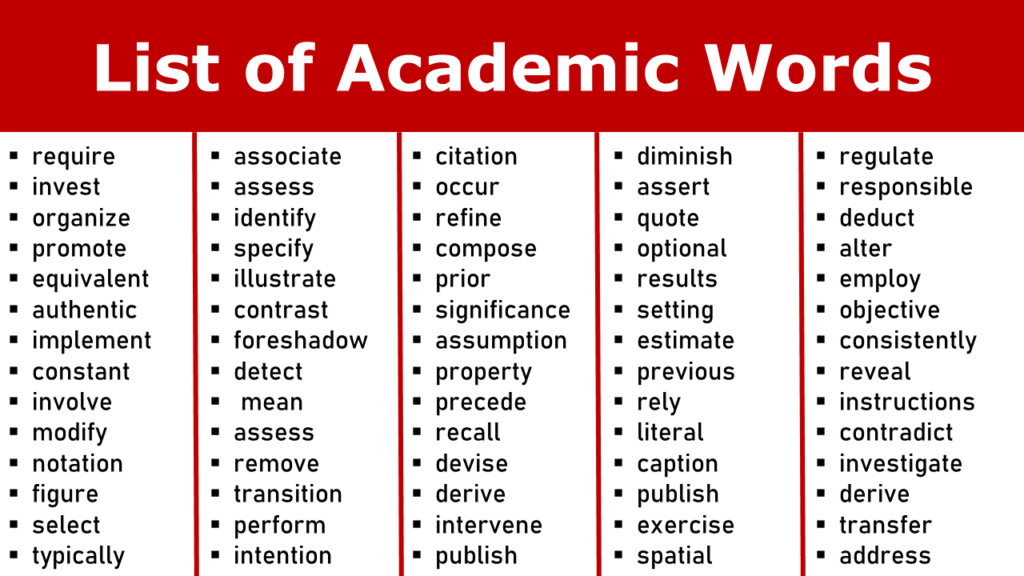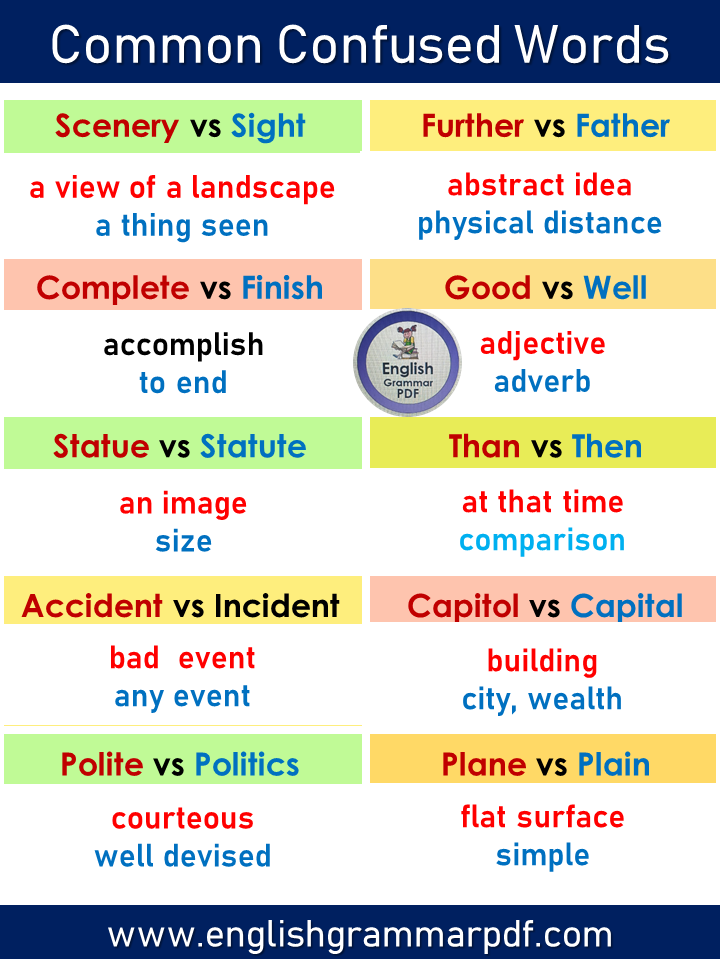Welcome to our latest blog post of over 100 Time Words. Whether you’re a language enthusiast, a budding writer, or simply looking to polish your communication skills, this comprehensive guide is packed with a wealth of time-related words.
From the essentials that mark our daily routines to more complex terms that define moments in history, our carefully curated list is designed to enrich your vocabulary and help you speak about time with ease and confidence.
As a bonus, we’ve included a downloadable PDF at the end of the lesson, so you can easily reference this extensive vocabulary list anytime. Let’s dive into the fascinating world of time words and explore how they can add precision and clarity to your conversations and writings.
Here are 20 most important time words and their meaning/definitions:
- Second: The base unit of time in the International System of Units (SI).
- Minute: A unit of time equal to 60 seconds.
- Hour: A unit of time equivalent to 60 minutes.
- Day: A period of 24 hours, representing a full rotation of the Earth on its axis.
- Week: A time period of seven days, often considered starting on Sunday or Monday.
- Month: A division of the year, typically consisting of 28 to 31 days.
- Year: A time period approximately equal to 365 days, representing the Earth’s orbit around the Sun.
- Decade: A period of ten years.
- Century: A period of one hundred years.
- Millennium: A period of one thousand years.
- Clock: A device used to measure and indicate time.
- Calendar: A system for organizing days into weeks, months, and years.
- Timeline: A graphical representation of a sequence of events in chronological order.
- Era: A long and distinct period of history with a particular feature or characteristic.
- Epoch: A notable period in history or a person’s life.
- Moment: A very brief period of time; an instant.
- Deadline: A date or time by which something must be finished or submitted.
- Duration: The time during which something continues or exists.
- Season: One of the four periods of the year (spring, summer, autumn, winter) marked by particular weather patterns and daylight hours.
- Eon: An indefinite and very long period of time, often a period exaggerated for humorous or rhetorical effect.
Also Read: Time Order Words in English
Time Words List
Below is the list of over 100 time words.
- Hour
- Minute
- Second
- Clock
- Calendar
- Midnight
- Noon
- Morning
- Evening
- Night
- Day
- Week
- Month
- Year
- Decade
- Century
- Millennium
- Era
- Age
- Eon
- Season
- Spring
- Summer
- Autumn
- Winter
- Solstice
- Equinox
- Chronology
- Instant
- Duration
- Period
- Interval
- Epoch
- Generation
- Anniversary
- Deadline
- Schedule
- Timeline
- Tempo
- Rhythm
- Moment
- Past
- Present
- Future
- Forenoon
- Afternoon
- Twilight
- Dawn
- Dusk
- Midday
- Fortnight
- Biennium
- Triennium
- Quadrennium
- Lustrum
- Decennium
- Score
- Jubilee
- Chronometer
- Stopwatch
- Timer
- Sundial
- Almanac
- Eternity
- Infinity
- Brief
- Longevity
- Transient
- Fleeting
- Enduring
- Temporary
- Permanent
- Chronic
- Acute
- Anachronism
- Synchronous
- Asynchronous
- Contemporary
- Ancient
- Antiquated
- Modern
- Historic
- Prehistoric
- Timeless
- Momentary
- Punctual
- Delay
- Haste
- Speed
- Slow
- Fast
- Quick
- Rapid
- Leisure
- Urgency
- Wait
- Countdown
- Overtime
- Timekeeper
- Nanosecond
- Hourglass
- Daytime
- Anytime
- When
- Per annum
- Later
- Following
- During morning
- Bicentennial
- Time zone
- Prime meridian
- Millisecond
- Grandfather clock
- Consequently
- After that
- While
- Leap second
- For a day
- During week
- Some of the time
- On time
- Yesterday
- Microsecond
- Watch
- Sometime
- Ordinarily
- Just as
- Final
- During afternoon
- Before
- Up until that
- O’clock
- International date line
- Every time
- At the same time
- Time
- Gradually
- Concurrently
- Digital clock
- Trimester
- Seldom
- At first
- Zulu time
- Then
- Premature
- Geologic time
- Clock face
- To begin with
- Quaver
- Horology
- Analog clock
- Tonight
- Hour hand
- Days of the week
- Timepiece
- Quarter hour
- Minute hand
- Hands
- Cuckoo clock
- Alarm clock
- Today
- Rarely
- Daylight
- Annual
- Sunrise
- Meantime
- Formerly
- Someday
- Once
- Bedtime
- Periodically
- Leap year
- For a hour
- Earlier
- Calendar year
- Semiquaver
- In the past
- Eventually
- At last
- Semester
- Picosecond
- Lunar month
- For a minute
- Early
- Synchronized
- Pocket watch
- Water clock
- Soon
- Last of all
- Finally
- During day
- Before hand
- Zone
- Midmorning
- Galactic year
- High noon
- Currently
- Am
- Late
- First
- Usually
- Since
- Occasionally
- Everyday
- At times
- Wristwatch
- Sunset
- Meanwhile
- Chronological
- Gnomon
- After
- Until
- Now
- At length
- Second hand
- Next
- As long as
- Pendulum clock
- Fiscal year
- During month
- Tomorrow
- Daylight savings time
- Another
- Biennial
- Half-life
- Afterwards
- Yesteryear
Time Words for Tenses
When discussing time words for tenses, it’s important to consider how different words and phrases can indicate past, present, or future actions in English. Here’s a list that categorizes time words according to their respective tenses:
Past Tense
- Yesterday: Refers to the day before today.
- Last [time period]: For example, “last week,” “last year,” “last month,” indicating the previous time period.
- Ago: Used to indicate a specific amount of time in the past, e.g., “two years ago.”
- Once: Can be used to refer to a time in the past, e.g., “once upon a time.”
- Then: Indicates a specific time in the past.
- Before: Refers to an earlier time.
- Previously: Indicates something happened before a certain point in time.
- Formerly: Used to refer to an earlier state or previous condition.
Present Tense
- Now: Refers to the current moment.
- Today: The current day.
- Currently: Indicates something happening at the present time.
- At the moment: Similar to “currently,” used for ongoing actions.
- These days: Refers to the current period or general state of affairs.
- Presently: Can mean “at the moment” or indicate that something will happen soon.
- Still: Indicates an ongoing situation that hasn’t changed.
Future Tense
- Tomorrow: The day after today.
- Next [time period]: For example, “next week,” “next year,” “next month,” indicating the following time period.
- Soon: Indicates that something will happen in the near future.
- Later: Refers to any time after the current moment.
- Eventually: Indicates something will happen at an unspecified time in the future.
- In [time period]: E.g., “in two days,” specifying when something will happen.
- Someday: An indefinite future time.
These words and phrases help in expressing actions in different tenses, providing clarity and context in terms of time in the English language.
10 Famous Phrases Related to Time
Here are ten famous phrases related to time:
- “Time is money.” – Often attributed to Benjamin Franklin, this phrase emphasizes the value of time and its potential to be used productively.
- “Time heals all wounds.” – A common saying expressing the belief that emotional or physical distress fades as time passes.
- “Time waits for no one.” – This phrase underscores the relentless and unstoppable nature of time.
- “A stitch in time saves nine.” – An old proverb suggesting that taking care of a problem early will prevent more work later.
- “Time flies when you’re having fun.” – Used to express how quickly time seems to pass when one is enjoying themselves.
- “There’s no time like the present.” – A common expression encouraging immediate action rather than delay.
- “Killing time.” – This phrase refers to engaging in an activity to pass the time, usually when waiting for something else to happen.
- “Better late than never.” – This adage suggests that it is better to do something late than not do it at all.
- “Lost time is never found again.” – Another phrase often attributed to Benjamin Franklin, highlighting the irretrievability of time once it has passed.
- “The sands of time.” – A poetic way to refer to the passage of time, likening it to sand in an hourglass.
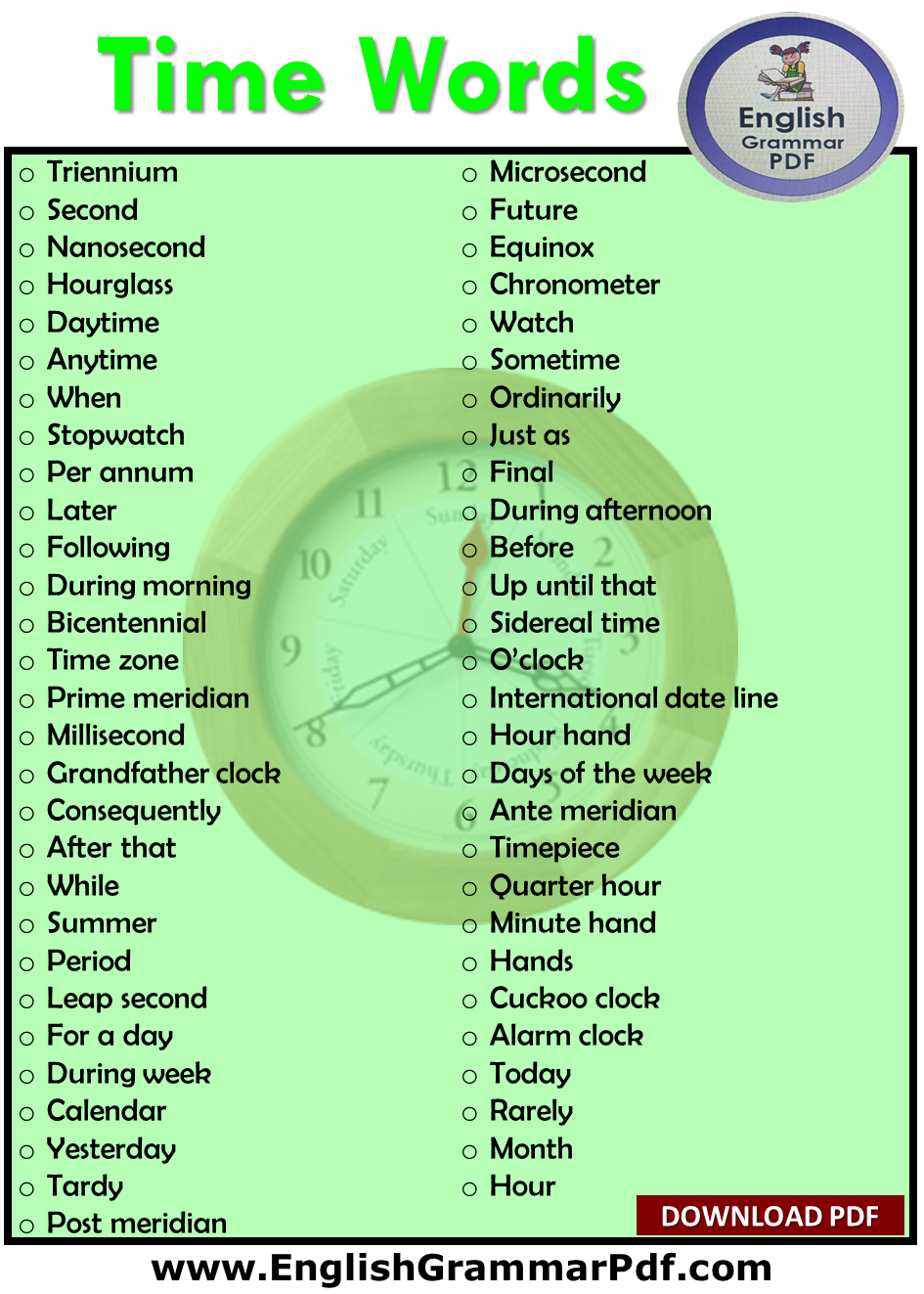
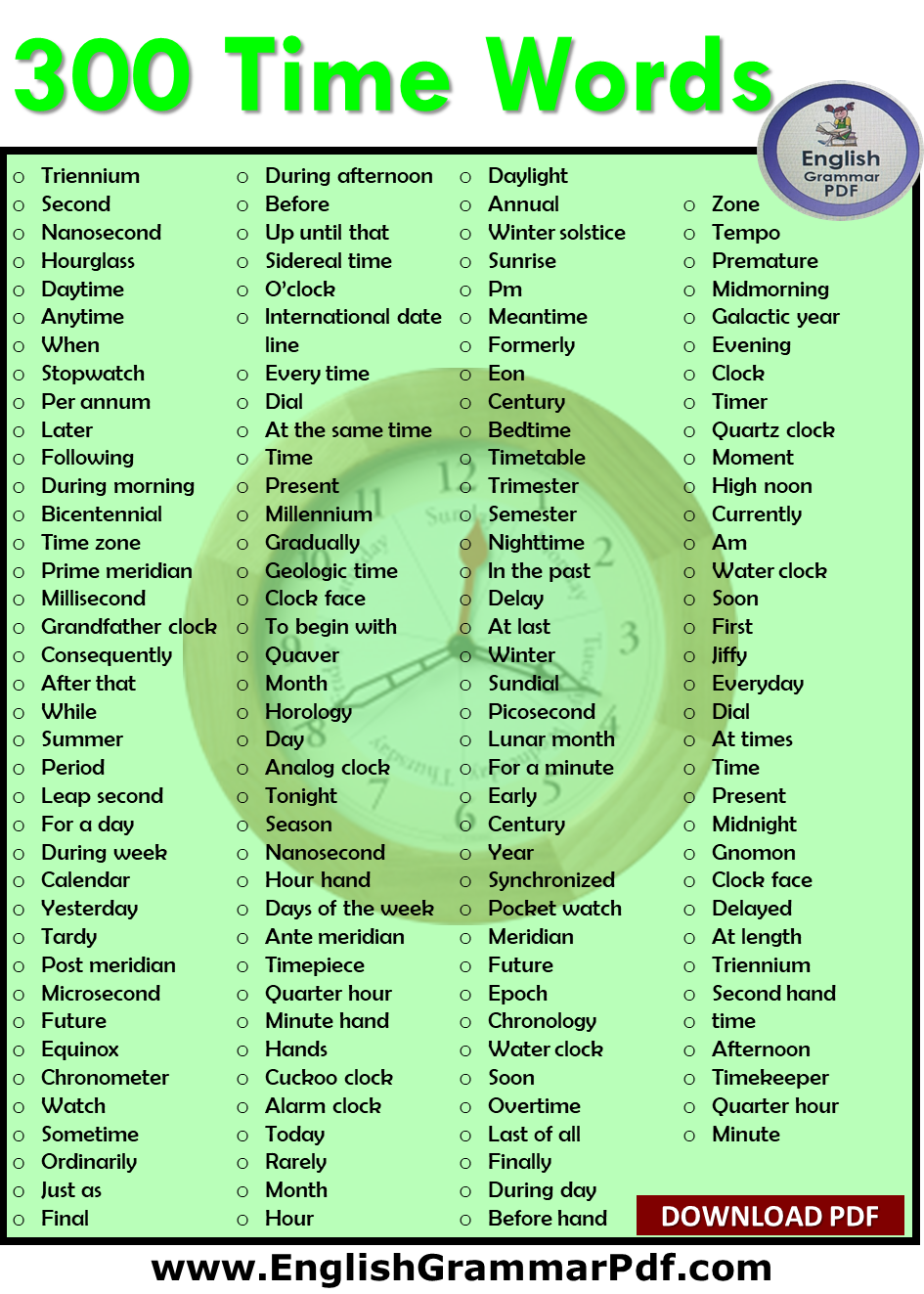
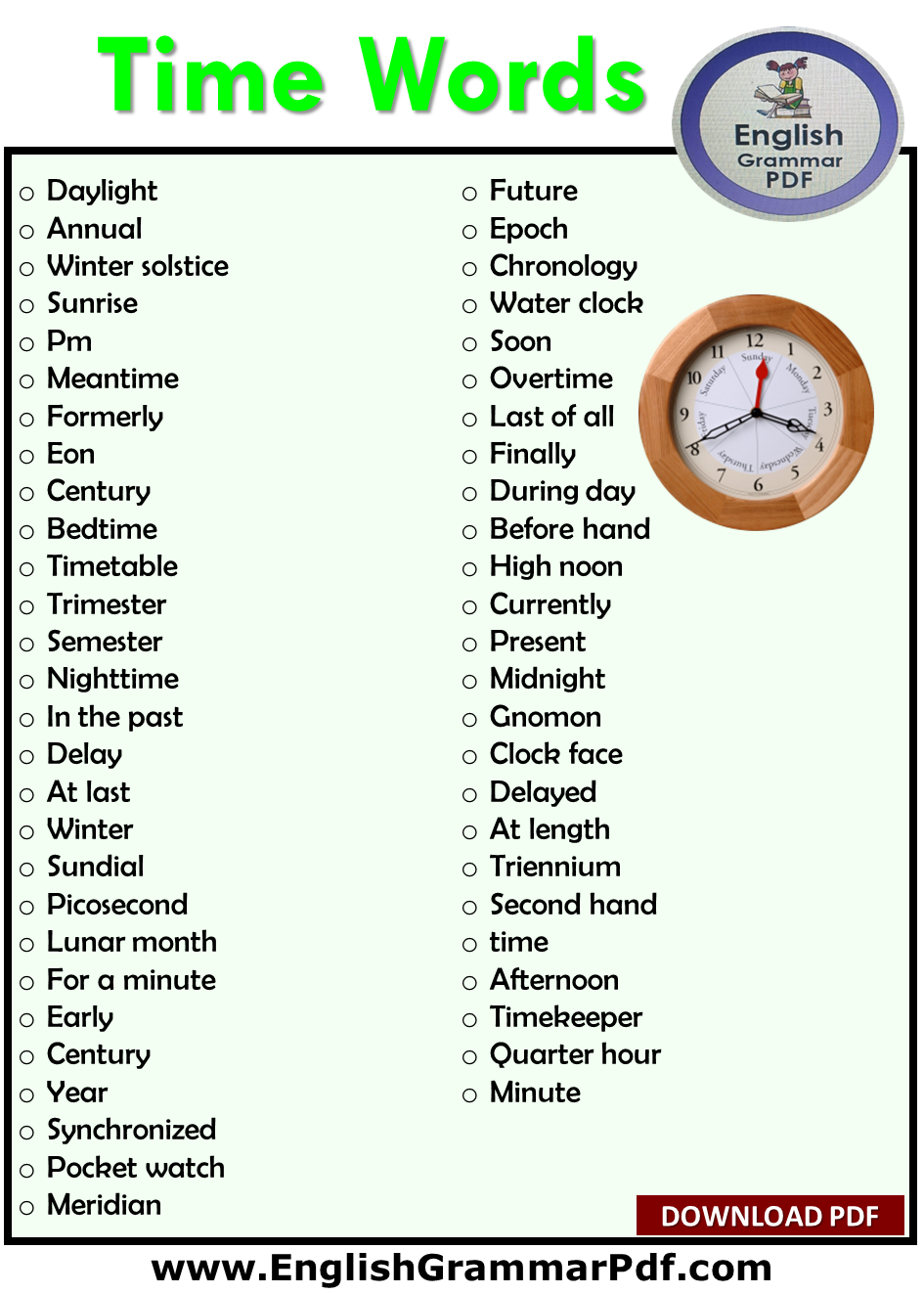
Download PDF of vocabulary related to time:

